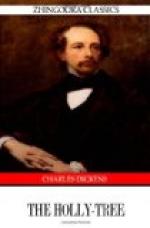The lonely day wore on, and I dozed it out, as a lonely traveller does. I was warm and valiant after eating and drinking,—particularly after dinner; cold and depressed at all other times. I was always bewildered as to time and place, and always more or less out of my senses. The coach and horses seemed to execute in chorus Auld Lang Syne, without a moment’s intermission. They kept the time and tune with the greatest regularity, and rose into the swell at the beginning of the Refrain, with a precision that worried me to death. While we changed horses, the guard and coachman went stumping up and down the road, printing off their shoes in the snow, and poured so much liquid consolation into themselves without being any the worse for it, that I began to confound them, as it darkened again, with two great white casks standing on end. Our horses tumbled down in solitary places, and we got them up,—which was the pleasantest variety I had, for it warmed me. And it snowed and snowed, and still it snowed, and never left off snowing. All night long we went on in this manner. Thus we came round the clock, upon the Great North Road, to the performance of Auld Lang Syne by day again. And it snowed and snowed, and still it snowed, and never left off snowing.
I forget now where we were at noon on the second day, and where we ought to have been; but I know that we were scores of miles behindhand, and that our case was growing worse every hour. The drift was becoming prodigiously deep; landmarks were getting snowed out; the road and the fields were all one; instead of having fences and hedge-rows to guide us, we went crunching on over an unbroken surface of ghastly white that might sink beneath us at any moment and drop us down a whole hillside. Still the coachman and guard—who kept together on the box, always in council, and looking well about them—made out the track with astonishing sagacity.




